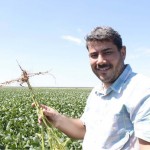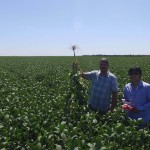
Cid Simões (’98, Brazil)
Cid sums up his contribution in Brazil with a few simple words: “I am doing what EARTH taught me to do.”
Upon graduating, Cid returned to Bahia State in his native Brazil and helped structure a heart of palm and ornamental flower business. His success as the company’s general manger resulted in the creation of a government program to expand flower production in the state. He was then a Project Consultant for Brazil’s Federal Ministry of Environment, where he worked to find innovative and sustainable alternative markets for more than 400 underserved families living in remote areas of the Brazilian Amazon. The project led to the creation of a latex leather made from rubber trees and a contract with Hermes in France, the extraction of oils for therapeutic and cosmetic industries, and a direct contract with Haagen-Dazs for the sale of Brazil Nuts.
In the four years that followed, Cid was the director of the BioBrasil Foundation, which is dedicated to the conservation of forests, environmental education, scientific research, and low-impact ecotourism. At the same time, he served as Secretary of Socio-Economic Development for the Mayor of Ituberá. Coordinating a team of 20 professionals, he was able to complete a landfill, organize chambers of commerce and agriculture, and build a low-income housing project.
Meanwhile, in 2002 together with his wife and fellow EARTH graduate Paola Soledad Segura Díaz, Cid started an innovative fruit and ornamentals project that resulted in the naming of Cid and Paola as National Geographic Emerging Explorers. The project consists of training poor families how to reforest slash and burn farm land with fruit trees and ornamentals. The idea is to increase incomes and long-term economic security for rural families using less space, while achieving harmony between agricultural production and conservation.
In 2008, Cid and Paola started a business venture called AMBIEM INDUSTRIA E COMERCIO LTDA, whose mission is to develop sustainable alternatives to agribusiness through Effective Microorganism (EM) biotechnology. AMBIEM has 250 clients, many of whom are rural farmers, who are using EM to reduce the use of agrochemicals. To-date the business has resulted in a 30% reduction of herbicides and a 20% reduction of fungicides on some 200,000 hectares of soy, corn, bean, grape, mango, orange and vegetable crops. The company, which directly employs 10 people, is also expanding to provide water treatment and quality services.
“Thanks to the excellent education that I received at EARTH, I have been successful in reaching my goals. But I am most proud of having successfully created my own business while respecting the environment, people and financial resources, and that in some small way we have been able to positively impact agriculture in my country.”
Cid, whose family was not able to contribute financially to his education, expresses enormous gratitude to the W.K. Kellogg Foundation for the scholarship to attend EARTH. Because of the opportunity, he says, he has been able to do what he can to conserve forests, clean rivers, ensure safe and clean food, and build healthy soils in Brazil.
EARTH, says Cid, “Has taught me all the values that I put in place to fulfill my job with dignity and respect. EARTH taught me to be connected to my surroundings, connected with the values of friendship, coexistence, cultural understanding, collaboration and mutual benefit. EARTH is full of values!”














